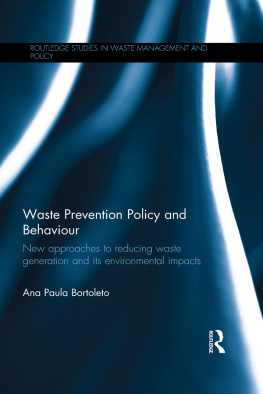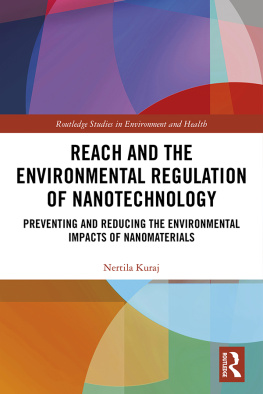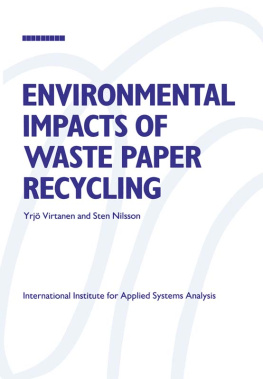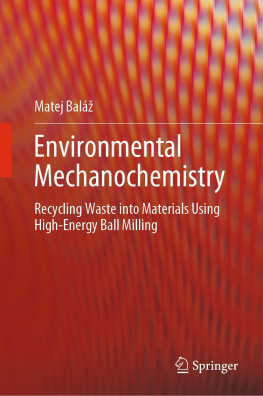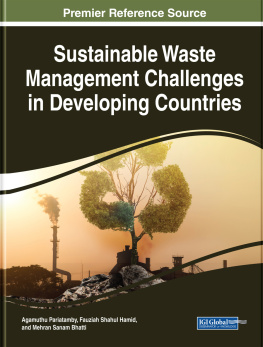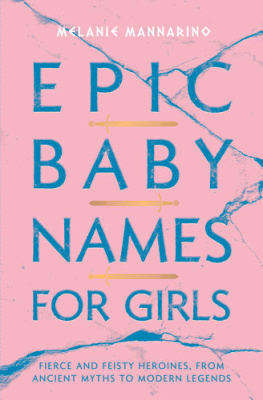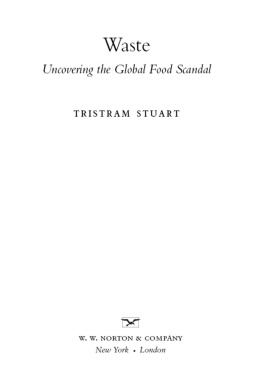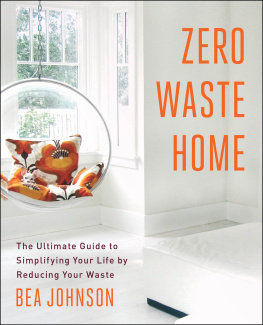Waste Prevention Policy and Behaviour
As prosperity levels rise, so too does the number of products and services being consumed. For policy makers in waste management facing a growing challenge, it is vital to understand the complex relationship between waste prevention policies and individual behaviour regarding waste generation. This book examines that interplay,taking a close look at the role of motivation, difficulties, values and constraints.
The first part of the book explores the theoretical framework, policy, barriers and facilitators for waste prevention behaviour. The second part presents in-depth case studies from three cities (So Paulo, Sheffield and Tokyo) examining the contextual factors, behavioural variations among them and the role of motivation and constraints in their populations. The book provides a detailed picture of how waste prevention policies enter the private, domestic sphere, offering insights for generating behavioural change at the household level and thus moving larger communities towards sustainable waste management.
The book will be of interest to students and researchers in the areas of environmental policy, management, sociology, psychology, geography, technology and waste studies.
Ana Paula Bortoleto is an Assistant Professor at the Faculty of Civil Engineering at the State University of Campinas, Brazil.
Routledge Studies in Waste Management and Policy
Waste Prevention Policy and Behaviour
New approaches to reducing waste generation and its environmental impacts
Ana Paula Bortoleto
Waste Prevention Policy and Behaviour
New approaches to reducing waste generation and its environmental impacts
Ana Paula Bortoleto
First published 2015
by Routledge
2 Park Square, Milton Park, Abingdon, Oxon OX14 4RN
and by Routledge
711 Third Avenue, New York, NY 10017
Routledge is an imprint of the Taylor & Francis Group, an informa business
2015 Ana Paula Bortoleto
The right of Ana Paula Bortoleto to be identified as author of this work has been asserted by her in accordance with sections 77 and 78 of the Copyright, Designs and Patents Act 1988.
All rights reserved. No part of this book maybe reprinted or reproduced or utilized in any form or by any electronic, mechanical, or other means, now known or hereafter invented, including photocopying and recording, or in any information storage or retrieval system, without permission in writing from the publishers.
Trademark notice: Product or corporate names may be trademarks or registered trademarks, and are used only for identification and explanation without intent to infringe.
British Library Cataloguing in Publication Data
A catalogue record for this book is available from the British Library
Library of Congress Cataloging in Publication Data
Bortoleto, Ana Paula.
Waste prevention policy and behaviour : new approaches to reducing waste generation and its environmental impacts / Ana Paula Bortoleto.
pages cm
1. Waste minimization. I.Title.
TD793.9.B67 2015
363.70561dc23 2014012112
ISBN: 978-0-415-73758-6 (hbk)
ISBN: 978-1-315-81794-1 (ebk)
Typeset in Goudy
by HWA Text and Data Management, London
To my family
Contents
PART I
Waste prevention policies: an overview
PART II
Waste prevention behaviour: conceptual issues
PART III
Waste prevention behaviour: case studies
PART IV
Conclusion
ANA PAULA BORTOLETO AND SIEGMAR OTTO
ANA PAULA BORTOLETO, ASTRID KAUSE AND KONSTANTINOS KATSIKOPOULOS
As Tom Jobim once wrote Tristeza no tem fim, felicidade sim (Sadness has no end, happiness yes), avoiding pain and suffering is the wish that follows us everywhere we go. But what is truly happiness? How do we deal with it? Although philosophy has been searching for its meaning since the ancient Greeks, there are still more questions than answers. In the twenty-first century, we live divided between enlightened and materialistic happiness. Nowadays, our culture involves mainly the acquisition of things linked to the culture of status. This makes us believe that buying a certain car will give us freedom or that youth is inside the new beauty product. This materialistic happiness comes from the emptiness created by the things we do not have and we are told they are necessary for living. The list of things needed for us to survive is getting bigger and bigger. And the result of this is waste. A mountain of things that we thought we needed and, after a brief space of time, fail to give us the promised happiness. Do not be confused; this book is indeed about waste prevention policies. But how can I write about this urgent topic without acknowledging the importance of why waste is created in the first place? Waste prevention is not only about waste and how to decrease its generation. It is about changing how we deal with waste, from something that needs to be burnt or buried to something resourceful that can be reused or repaired. It is thinking about what we consume and how we perceive the value of these things. Waste managers need to start addressing these questions, nevertheless, in an effective way. Technology alone is not capable of running at the same speed that waste is generated. It cannot treat this amount of waste or even tackle its environmental impacts. How can we achieve a sustainable society without understanding all facets of the problem? This book aims to open this door showing how important it is to comprehend human behaviour prior to the implementation of any waste prevention programme. More importantly, how it is possible to merge this knowledge for future research not only in waste prevention policies but also in technology innovation for waste management. As a former Marie Curie Fellow, and an admirer of this amazing researcher, I would like to use one of her quotes to explain what is urgent for us to achieve in waste prevention policies:
You cannot hope to build a better world without improving the individuals. To that end, each of us must work for our own improvement and, at the same time, share a general responsibility for all humanity, our particular duty being to aid those to whom we think can be most useful.
(Marie Curie, physicist 18671934)
Only when we adopt this approach to waste management will we be able to bring the situation under control.
My interest on waste started when I was an undergraduate looking for a research topic for my first scientific project. In 2001, waste issues were beginning to challenge Brazilian local governments and, as an engineering student, it seemed logical to me that this was a problem which could be solved with the right technology and management. Recycling was promised at that time and I decided to study how the universitys hospital could improve their recycling rate to decrease the costs of waste management. After securing financial support, I started accounting the materials used in one of the hospital wards and also searching through the non-hazardous waste collected in plastic bags. My first week opening the bags would be the last one. Inside the plastic bags were food leftovers, office paper, plastics, beverage cans, and, to my surprise, medical waste contaminated with patients blood. Because of the obvious risks, I was not allowed to open the bags anymore but this stimulated my interest in finding out why the waste was being mixed despite strong regulations. For this day on, I was talking to the nurses, the cleaning staff and anyone could give me any information as well as taking pictures and documenting everything. At the end, doctors, nurses, cleaning and office staff were mixing the waste mainly because of the distribution of the waste bins in the ward. In the end, I was able to understand that recycling had its downside but also that waste was the linking factor among all those actors. I am grateful to my dedicated supervisor, Dr Egle Novaes Teixeira for this opportunity which stimulated my passion for researching this topic and also to Professor Paulo Franco Barbosa, who opened the doors of the scientific world as his student on the former PET programme.

